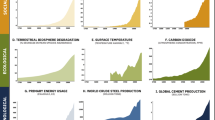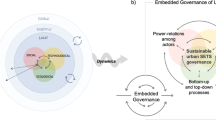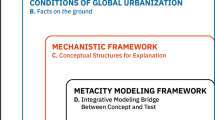Abstract
Urbanization is a global phenomenon with strong sustainability implications across multiple scales. We argue that much of the associated challenges, and opportunities, are found in the global south. We show that urban issues in the global south are distinctly and statistically different from those in the global north, but our current urban knowledge is predominantly shaped by research on and from the global north. Cities in the global south have strong imperatives, and unique but often overlooked capacity, to innovate and experiment for sustainability. We call for a renewed research focus on urbanization in the south, and suggest targeted efforts to correct structural biases in the knowledge production system.
This is a preview of subscription content, access via your institution
Access options
Access Nature and 54 other Nature Portfolio journals
Get Nature+, our best-value online-access subscription
$29.99 / 30 days
cancel any time
Subscribe to this journal
Receive 12 digital issues and online access to articles
$119.00 per year
only $9.92 per issue
Buy this article
- Purchase on Springer Link
- Instant access to full article PDF
Prices may be subject to local taxes which are calculated during checkout




Similar content being viewed by others
References
United Nations. World Urbanization Prospects: The 2014 Revision (United Nations Department of Economic and Social Affairs, 2014).
Grimm, N. B. et al. Global change and the ecology of cities. Science 319, 756–760 (2008).
Wigginton, N. S., Fahrenkamp-Uppenbrink, J., Wible, B. & Malakoff, D. Cities are the future. Science 352, 904–905 (2016).
Griggs, D. et al. Policy: sustainable development goals for people and planet. Nature 495, 305–307 (2013).
DeFries, R. S., Rudel, T., Uriarte, M. & Hansen, M. Deforestation driven by urban population growth and agricultural trade in the twenty-first century. Nat. Geosci. 3, 178–181 (2010).
Seto, K. C., Güneralp, B. & Hutyra, L. R. Global forecasts of urban expansion to 2030 and direct impacts on biodiversity and carbon pools. Proc. Natl Acad. Sci. USA 109, 16083–16088 (2012).
Chen, Z., Wang, J. N., Ma, G. X. & Zhang, Y. S. China tackles the health effects of air pollution. Lancet 382, 1959–1960 (2013).
Hallegatte, S., Bangalore, M., Fay, M., Kane, T. & Bonzanigo, L. Shock Waves: Managing the Impacts of Climate Change on Poverty (World Bank Publications, 2015).
Bai, X., Shi, P. & Liu, Y. Society: Realizing China’s urban dream. Nature 509, 158–160 (2014).
McPhearson, T. et al. Advancing urban ecology toward a science of cities. BioScience 66, 198–212 (2016).
Parnell, S., Elmqvist, T., McPhearson, T., Nagendra, H. & Sörlin, S. in Urban Planet (eds Elmqvist, T. et al.) Ch. 1 (Cambridge Univ. Press, Cambridge, 2018).
Atlas of Sustainable Development Goals 2017: From World Development Indicators (World Bank, 2017); https://openknowledge.worldbank.org/handle/10986/26306
The World’s Cities in 2016 – Data Booklet ST/ESA/ SER.A/392 (United Nations, Department of Economic and Social Affairs, Population Division, 2016).
Cohen, B. Urban growth in developing countries: a review of current trends and a caution regarding existing forecasts. World Dev. 32, 23–51 (2004).
Chen, M., Zhang, H., Liu, W. & Zhang, W. The global pattern of urbanization and economic growth: evidence from the last three decades. PLoS ONE 9, p.e103799 (2014).
McDonald, R. I. et al. Water on an urban planet: urbanization and the reach of urban water infrastructure. Glob. Environ. Change 27, 96–105 (2014).
Gollin, D., Jedwab, R. & Vollrath, D. Urbanization with and without industrialization. J. Econ. Growth 21, 35–70 (2016).
Huchzermeyer, M. Cities with Slums: From Informal Settlement Eradication to a Right to the City in Africa (Juta Academic, Claremont, 2011).
Kharas, H. The Emerging Middle Class in Developing Countries (OECD, 2010).
Gong, P. et al. Urbanisation and health in China. Lancet 379, 843–852 (2012).
Hodson, M., Marvin, S., Robinson, B. & Swilling, M. Reshaping urban infrastructure. J. Ind. Ecol. 16, 789–800 (2012).
Marais, L. & Cloete, J. The role of secondary cities in managing urbanisation in South Africa. Dev. South. Afr. 34, 182–195 (2016).
Pingali, P. Westernization of Asian diets and the transformation of food systems: implications for research and policy. Food Policy 32, 281–298 (2007).
Ramaswami, A., Chavez, A. & Chertow, M. Carbon footprinting of cities and implications for analysis of urban material and energy flows. J. Ind. Ecol. 16, 783–785 (2012).
Bai, X. et al. Six research priorities for cities and climate change. Nature 555, 23–25 (2018).
Lin, T. et al. Managing urban nutrient biogeochemistry for sustainable urbanization. Environ. Pollut. 192, 244–250 (2014).
Tregidgo, D. J., Barlow., J., Pompeu, P. S., Rocha, M. A. & Parry, L. Rainforest metropolis casts 1,000-km defaunation shadow. Proc. Natl Acad. Sci. USA 114, 8655–8659 (2017).
Chauvin, J. P., Glaeser, E., Ma, Y. & Tobio, K. What is different about urbanization in rich and poor countries? Cities in Brazil, China, India and the United States. J. Urban Econ. 98, 17–49 (2017).
Duranton, G. Growing through cities in developing countries. World Bank Res. Obs. 30, 39–73 (2015).
Sadorsky, P. Do urbanization and industrialization affect energy intensity in developing countries? Energy Econ. 37, 52–59 (2013).
Turok, I. Turning the tide? The emergence of national urban policies in Africa. J. Contemp. Afr. Stud. 33, 348–369 (2015).
Bonilla, M. & Zapparoli, I. The Challenge of Financing Urban Infrastructure for Sustainable Cities (Inter-American Development Bank, 2017); https://go.nature.com/2tZJBkk
Shatkin, G. The real estate turn in policy and planning: land monetization and the political economy of peri-urbanization in Asia. Cities 53, 141–149 (2016).
Metodología del ranking (2015) de las 50 ciudades más violentas del mundo (El Consejo Ciudadano para la Seguridad Pública y la Justicia Penal AC, 2016); http://www.seguridadjusticiaypaz.org.mx
Bettencourt, L. M., Lobo, J., Helbing, D., Kühnert, C. & West, G. Growth, innovation, scaling, and the pace of life in cities. Proc. Natl Acad. Sci. USA 104, 7301–7306 (2007).
Scott, A. J. & Storper, M. The nature of cities: the scope and limits of urban theory. Int. J. Urban Reg. Res. 39, 1–15 (2015).
Alberti, M. Grand challenges in urban science. Front. Built Environ. 3, 1–5 (2017).
Satterthwaite, D. The Transition to a Predominantly Urban World and its Underpinnings (International Institute for Environment and Development, 2007).
Eakin, H. et al. Urban resilience efforts must consider social and political forces. Proc. Natl Acad. Sci. USA 114, 186–189 (2017).
Alberti, M. Measuring urban sustainability. Environ. Impact Assess. Rev. 16, 381–424 (1996).
Hardoy, J. E. & Satterthwaite, D. Squatter Citizen: Life in the Urban Third World (Routledge, Oxon, 2014).
Parnell, S. & Robinson, J. (Re)theorizing cities from the global south: looking beyond neoliberalism. Urban Geogr. 33, 593–617 (2012).
Bayat, A. in Megacities: The Politics of Urban Exclusion and Violence in the Global South (eds Kooning, K. & Kruijt, D.) Ch. 5 (Zed Books, New York, NY, 2009).
Wolch, J. R., Byrne, J. & Newell, J. P. Urban green space, public health, and environmental justice: the challenge of making cities ‘just green enough’. Landsc. Urban Plan. 125, 234–244 (2014).
Harvey, D. The right to the city. City Read. 6, 23–40 (2008).
Mitlin, D. in Claiming the City: Civil Society Mobilisation by the Urban Poor (eds Moksnes, H. & Melin, M.) 15–31 (Uppsala Univ., Uppsala, 2014).
Roy, A. Why India cannot plan its cities: informality, insurgence and the idiom of urbanization. Plan. Theory 8, 76–87 (2009).
Watson, V. Co-production and collaboration in planning — the difference. Plan. Theory Pract. 1, 62–76 (2014).
Kusumawijaya, M. Jakarta versus Vancouver: Can the environment win? IDRC Digital Library (2007); https://idl-bnc-idrc.dspacedirect.org/handle/10625/41502
Romero-Lankao, P., Qin, H. & Dickinson, K. Vulnerability to temperature-related hazards: a meta-analysis and meta-knowledge approach. Glob. Environ. Change 22, 670–683 (2012).
de Souza, M. L. Gentrification in Latin America: some notes on unity in diversity. Urban Geogr. 37, 1235–1244 (2016).
Ghertner, D. A. in Global Political Ecology (eds Peet, R. et al.) Ch. 7 (Routledge London and New York, NY, 2011).
Karlsson, S., Srebotnjak, T. & Gonzales, P. Understanding the north–south knowledge divide and its implications for policy: a quantitative analysis of the generation of scientific knowledge in the environmental sciences. Environ. Sci. Policy 10, 668–684 (2007).
Collyer, F. M. Global patterns in the publishing of academic knowledge: global north, global south. Curr. Sociol. 1, 56–73 (2016).
Parnell, S. & Oldfield, S. (eds) The Routledge Handbook on Cities of the Global South (Routledge, Oxon, 2014).
Ramaswami, A., Russell, A. G., Culligan, P. J., Sharma, K. R. & Kumar, E. Meta-principles for developing smart, sustainable, and healthy cities. Science 352, 940–943 (2016).
Fast Facts: Urbanization in Asia (Asian Development Bank, 2011); https://www.adb.org/sites/default/files/Urbanization-fast-facts.pdf
Pucher, J., Park, H., Kim, M. H. & Song, J. Public transport reforms in Seoul: innovations motivated by funding crisis. J. Public Trans. 8, 41–62 (2005).
Rao, B. C. How disruptive is frugal? Technol. Soc. 35, 65–73 (2013).
Revi, A. et al. in Climate Change 2014: Impacts, Adaptation, and Vulnerability (eds Field, C. B. et al.) 535–612 (IPCC, Cambridge Univ. Press, 2014).
Lerner, J. A song of the city. https://www.ted.com/talks/jaime_lerner_sings_of_the_city (2007).
Roberts, D. et al. Exploring ecosystem-based adaptation in Durban, South Africa: “learning-by-doing” at the local government coal face. Environ. Urban. 24, 167–195 (2012).
Wong, T. How developing cities can meet the challenges of the 21st century. Asian Development Blog https://blogs.adb.org/blog/how-developing-cities-can-meet-challenges-21st-century (2017).
Foxon, T. & Pearson, P. Overcoming barriers to innovation and diffusion of cleaner technologies: some features of a sustainable innovation policy regime. J. Clean. Prod. 16, S148–S161 (2008).
Swist, T., Magee, L., Phuong, J. & Sweeting, D. The labour of communicating publics: participatory platforms, socio-technical intermediaries and pluralistic expertise. Commun. Public 2, 210–225 (2017).
Nagendra, H., Sudhira, H. S., Katti, M. & Schewenius, M. in Urbanization, Biodiversity, and Ecosystem Services: Challenges and Opportunities (eds Elmqvist, T. et al.) Ch. 6 (Springer, Dordrechet, 2013).
Peng, Y. & Bai, X. Experimenting towards a low-carbon city: policy evolution and nested structure of innovation. J. Clean. Prod. 174, 201–212 (2018).
Jia, H., Wang, Z. & Yu, S. L. Opportunity and challenge: China’s sponge city plan. Hydrolink 4, 100–102 (2016).
Nagendra, H. & Ostrom, E. Applying the social-ecological systems framework to the diagnoses of urban commons. Ecol. Soc. 19, 67 (2014).
Kareem, B. & Lwasa, S. Gender responsiveness in infrastructure provision for African cities: the case of Kampala in Uganda. J. Geogr. Reg. Plan. 7, 1–9 (2014).
Lwasa, S. Planning innovation for better urban communities in sub-Saharan Africa: the education challenge and potential responses. Town Reg. Plan. 60, 38–48 (2013).
Nevens, F., Frantzeskaki, N., Gorissen, L. & Loorbach, D. Urban transition labs: co-creating transformative action for sustainable cities. J. Clean. Prod. 50, 111–122 (2013).
Sengers, F. F., Berkhout, F., Wieczorek, A. A. & Raven, R. R. in The Experimental City (eds Evans, J., Karvonen, A. & Raven, R.) 15 (Routledge, Oxon, 2015).
Bulkeley, H. & Castán Broto, V. Government by experiment? Global cities and the governing of climate change. Trans. Inst. Br. Geogr. 38, 361–375 (2013).
Bai, X., Roberts, B. & Chen, J. Urban sustainability experiments in Asia: patterns and pathways. Environ. Sci. Policy 13, 312–325 (2010).
Roberts, B. & Kanaley, T. (eds) Urbanization and Sustainability in Asia: Case Studies of Good Practice (Asian Development Bank, 2006).
Solecki, W., Seto, K. C. & Marcotullio, P. It’s time for an urbanization science, environment: science and policy for sustainable development. Environ. Sci. Policy Sustain. Dev. 55, 12–17 (2013).
Groffman, P. M. et al. Moving towards a new urban systems science. Ecosystems 1, 38–43 (2017).
Elmqvist, T. et al. (eds) The Urban Planet: Knowledge Toward Livable Cities (Cambridge Univ. Press, Cambridge, 2018).
Acuto, M., Parnell, S. & Seto, K. C. Building a global urban science. Nat. Sustain. 1, 2–4 (2018).
Cornell, S. et al. Opening up knowledge systems for better responses to global environmental change. Environ. Sci. Policy 28, 60–70 (2013).
Bai, X. et al. Understanding urban–environmental linkages: conceptual and empirical advances. Annu. Rev. Environ. Resour. 42, 215–240 (2017).
Marais, L., Nel, E. & Donaldson, R. in Secondary Cities and Development (eds Marais, L., Nel, E. & Donaldson, R.) Ch. 1 (Routledge, Oxon, 2016).
Choi, J., Hwang, M., Kim, G., Seong, J. & Ahn, J. Supporting the measurement of the United Nations’ sustainable development goal 11 through the use of national urban information systems and open geospatial technologies: a case study of south Korea. Open Geospat. Data Softw. Stand. 1, 4 (2016).
Klopp, J. M. & Petretta, D. L. The urban sustainable development goal: indicators, complexity and the politics of measuring cities. Cities 63, 92–97 (2017).
Bai, X. et al. Defining and advancing a systems approach for sustainable cities. Curr. Opin. Environ. Sustain. 23, 69–78 (2016).
Yeung, H. W. Redressing the geographical bias in social science knowledge. Environ. Plann. A 33, 1–9 (2001).
Diaz, S. et al. Assessing nature’s contributions to people. Science 359, 270–272 (2018).
Nagendra, H. The global south is rich in sustainability lessons. Nature 557, 485–388 (2018).
Acknowledgements
H.N. acknowledges research funding from Azim Premji University’s Centre for Urban Ecological Sustainability. E.S.B. acknowledges support from the United States National Science Foundation for the project ‘Catalyzing action towards sustainability of deltaic systems with an integrated modeling framework for risk assessment (BF-DELTAS)’ (NSF # 1342898). We thank S. Agarwal, E. Bhar, C. Hilliker, S. Mundoli, A. Tabassum, P. Venkatram and Y. Zhang for assistance with data coding and figures. This Perspective is a contribution to the Future Earth Urban Knowledge-Action Network.
Author information
Authors and Affiliations
Contributions
H.N. and X.B. conceived the paper. H.N., X.B. and E.S.B. designed and conducted the analysis. All authors wrote and commented on the manuscript.
Corresponding authors
Ethics declarations
Competing interests
The author declare no competing interests.
Additional information
Publisher’s note: Springer Nature remains neutral with regard to jurisdictional claims in published maps and institutional affiliations.
Supplementary information
Supplementary Information
Supplementary Tables 1 and 2, Supplementary Figure 1
Rights and permissions
About this article
Cite this article
Nagendra, H., Bai, X., Brondizio, E.S. et al. The urban south and the predicament of global sustainability. Nat Sustain 1, 341–349 (2018). https://doi.org/10.1038/s41893-018-0101-5
Received:
Revised:
Accepted:
Published:
Issue Date:
DOI: https://doi.org/10.1038/s41893-018-0101-5
This article is cited by
-
Effects of landscape pattern on land surface temperature in Nanchang, China
Scientific Reports (2024)
-
TIMEWISE: Temporal Dynamics for Urban Resilience - theoretical insights and empirical reflections from Amsterdam and Mumbai
npj Urban Sustainability (2024)
-
Benefits and co-benefits of urban green infrastructure for sustainable cities: six current and emerging themes
Sustainability Science (2024)
-
Enabling urban systems transformations: co-developing national and local strategies
Urban Transformations (2023)
-
Millions of jobs in food production are disappearing — a change in mindset would help to keep them
Nature (2023)



